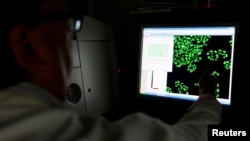U.S. researchers have discovered a new weakness in one of the most feared kinds of cancers. their approach uses a modified version of vitamin D to help anti-cancer medicine reach the tumor.
Doctors have been making progress in treating many cancers, but not this one.
“Pancreatic cancer is the kind of diagnosis that you do not want to get when you go into your doctor’s office," said Ronald Evans of the Salk Institute in California.
He hopes to change that with his latest research, which focuses on stellate cells. They are a rare kind of cell in the pancreas that jump into action when a cancer starts growing nearby.
“When the tumor’s there, that cell gets very angry," he said. "It does not like the tumor. And so it begins to play a different role, which is defending the pancreas. And then we call it ‘activated.’”
Stellate cells send out a signal to other nearby cells to bolster their defense against the tumor. But according to Evans, the tumor is "listening" to that growth signal, and it grows, too.
“We realized and we deduced that if we can calm the first one down, that is the stellate cell, that you deprive the tumor of a lot of the stimulus that it needs to keep growing," he said.
Also, when the stellate cells are in their “angry” state, they act as a barrier that prevents anti-cancer drugs from reaching the tumor.
It turns out that the stellate cells have a kind of switch to calm them down. Evans and his colleagues figured out that a modified form of vitamin D can activate that switch, calm down the growth signal, and lower the barrier that blocks chemotherapy.
Normally, a basic-science discovery like this is published and later - often years later - is put to the test in human clinical trials. But in a very unusual sequence, this time testing in humans has already begun.
“We were able to get our drug and our discovery approved for the use in pancreatic cancer trials before our paper was even published," said Evans. "That’s how excited people were.”
The research paper by Ronald Evans of the Salk Institute and his colleagues is published in the journal Cell.









